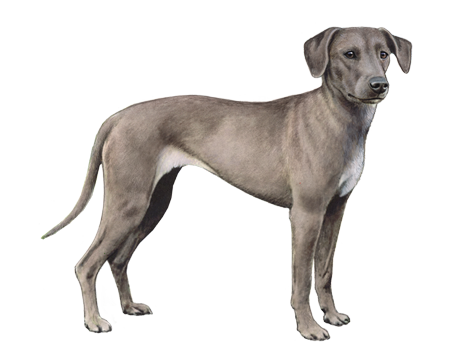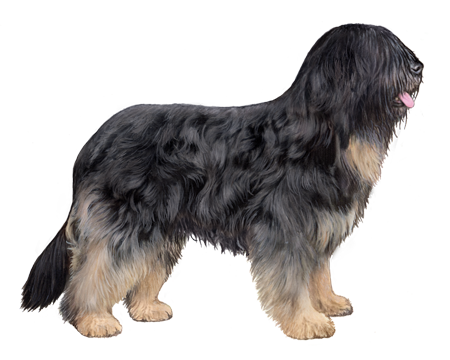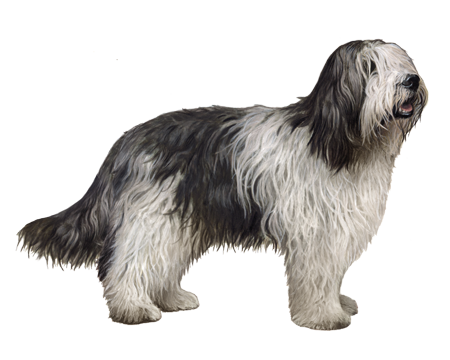
Polish Lowland Sheepdog
The Polish Lowland Sheepdog is a clever and self-confident working breed. With consistent training, these adorable, fluffy dogs make faithful watchdogs and companions.
Interested in discovering if your dog is a Polish Lowland Sheepdog?
Check out Wisdom Panel's DNA tests.

Polish Lowland Sheepdog Traits
General Appearance
Polish Lowland Sheepdogs are medium-sized, compact, strong dogs with bright, perceptive personalities and a penetrating gaze.
Coat and Coloring
A soft, dense undercoat and a long, shaggy outer coat comprise the Polish Lowland Sheepdog's double coat. In the show ring, Polish Lowland Sheepdogs must have their natural, unkempt/ungroomed hair.
All coat colors are acceptable under the breed standard. Some of the most common are black, gray, beige, brown, black and white, chocolate and white, gray and white, and tri-colored. Different coat colors have different textures. For example, Polish Lowland Sheepdogs with black coats have little or no coarse outer coat and less undercoat than dogs of other colors.
Distinctive Physical Traits
Polish Lowland Sheepdogs are medium-sized, rectangular-shaped dogs. They have level toplines, deep chests, muscular fore- and hindquarters, and full-length or natural bobbed tails.
The breed's head is in proportion to the body and features heart-shaped, high-set dropped ears and a large black or brown nose. The Polish Lowland Sheepdog's medium-sized, oval brown eyes convey a lively expression and penetrating gaze.
Polish Lowland Sheepdog Temperament
Polish Lowland Sheepdogs are energetic, active working dogs that fearlessly defend their flocks. But they have also become popular as pets. At home, these gentle, affectionate dogs make excellent playmates. And Polish Lowland Sheepdogs are generally accepting of other animals. But because of their strong herding instincts, they may attempt to corral and control them.
Accustomed to working solo, Polish Lowland Sheepdogs are comfortable making decisions independent of their owners. This makes them effective in their work. But it can also give them dominating and stubborn tendencies. Fortunately, consistent training can help.
This adaptable breed will quickly adjust to a range of living conditions—from urban apartment or suburban yard to rural acreage. Regardless of where they live, Polish Lowland Sheepdogs require a lot of exercise to be happy and healthy. And they may be wary of strangers, but this makes them excellent watchdogs.


Polish Lowland Sheepdog History
In 1514, Polish merchant Kazimierz Grabski traveled to Scotland, where he traded a shipment of grain for sheep. Grabski knew it would be difficult to move the sheep on his own. So, he brought six Polish Lowland Sheepdogs along to help with the task.
Impressed with their herding skills, the Scottish shepherd traded a ram and ewe for three of Grabski’s Polish Lowland Sheepdogs. From there, the breed's popularity quickly grew among shepherds.
The Polish Lowland Sheepdog, known as Polish Owczarek Nizinny (PON) in Poland, might have descended from a Hungarian herding dog called the Puli.
Polish Lowland Sheepdog Care
Nutrition
Polish Lowland Sheepdogs need a high-quality dog food formulated for their life stage (e.g., puppy, adult, senior). To avoid overfeeding, measure out meals, and limit treats to no more than 10% of their daily calories.
Grooming
To stay looking their best, Polish Lowland Sheepdogs require a lot of maintenance. The double-coated breed needs thorough grooming every week to remove dead hair and prevent mats and tangles. Some pet parents take their Polish Lowland Sheepdogs to the groomer for a puppy cut. But even dogs with shorter coats require regular brushing and bathing.
Trimming nails, cleaning ears, and brushing teeth should also be part of every dog's grooming routine, regardless of breed.
Exercise
As an active breed, the Polish Lowland Sheepdog needs regular exercise. In addition to brisk walks, these dogs appreciate trips to the park and playing games like fetch in large, fenced areas.
Polish Lowland Sheepdogs also excel at dog sports—such as agility, obedience, dock diving, and herding. To keep this breed happy, opt for activities that provide both mental and physical stimulation, such as hide-and-seek or puzzle toys.
Training
Because Polish Lowland Sheepdogs can be stubborn and independent, training is a must. This breed responds best to a consistent training routine that incorporates positive reinforcement and rewards.
Early socialization is important, too. Be sure to introduce your Polish Lowland Sheepdog puppy to new people, pets, and places to help them become a well-mannered, well-adjusted dog.

Polish Lowland Sheepdog Genetic Health Conditions
-
Chondrodystrophy (CDDY) and Intervertebral Disc Disease (IVDD) Risk
Chondrodystrophy (CDDY) is a skeletal disorder characterized by shortened limbs and abnormal early degeneration of the spinal discs, or intervertebral disc disease (IVDD), which predisposes to disc herniation.
Knowing if your Polish Lowland Sheepdog is a carrier or at-risk for these conditions can help you and your veterinarian plan for your pup’s lifelong care. With Wisdom Panel™ Premium, you can get results for over 200 genetic health tests.
Breed Group
Herding
The herding group is a diverse category. These highly intelligent breeds were developed to guard and control the movement of livestock.
Resources
http://www.aponc.org/history%20of%20the%20breed.htm
http://images.akc.org/pdf/breeds/standards/PolishLowlandSheepdog.pdf
https://www.akc.org/dog-breeds/polish-lowland-sheepdog/
Reviewed July 26, 2020 by Cindy Elston, DVM, MPH


































































